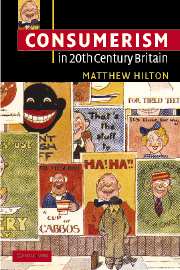Book contents
- Frontmatter
- Contents
- List of illustrations
- Acknowledgements
- List of abbreviations
- Introduction: luxury's shadow
- Part I Necessity
- 1 Socialism, co-operation, Free Trade and fair trade: the politics of consumption in the nineteenth century
- 2 Revolutionary shoppers: the Consumers' Council and scarcity in World War One
- 3 The right to live: consumer ‘ideology’ in inter-war Britain
- 4 The price of depression: consumer politics in inter-war Britain
- 5 Austerity to affluence: the twilight of the politics of necessity
- Part II Affluence
- Conclusion: the quantity or the quality of choice
- Bibliography
- Index
1 - Socialism, co-operation, Free Trade and fair trade: the politics of consumption in the nineteenth century
Published online by Cambridge University Press: 10 December 2009
- Frontmatter
- Contents
- List of illustrations
- Acknowledgements
- List of abbreviations
- Introduction: luxury's shadow
- Part I Necessity
- 1 Socialism, co-operation, Free Trade and fair trade: the politics of consumption in the nineteenth century
- 2 Revolutionary shoppers: the Consumers' Council and scarcity in World War One
- 3 The right to live: consumer ‘ideology’ in inter-war Britain
- 4 The price of depression: consumer politics in inter-war Britain
- 5 Austerity to affluence: the twilight of the politics of necessity
- Part II Affluence
- Conclusion: the quantity or the quality of choice
- Bibliography
- Index
Summary
How do people think about money? Are we more conscious of money as a financial return on our labour, or as the goods into which it can be converted? Are we wage-conscious or price-conscious? Do we produce to earn, or earn to spend? Are our identities structured around production or consumption? The answer must surely be that production and consumption are entirely intertwined in our economic lives, if not our social, political and cultural lives as well. We are what we eat and we are what we make. We have the potential to be creative, imaginative and intelligent subjects in the factory, the office, the shop and the home. Ultimately, we aim to share in the ‘fables of abundance’ of a rich and diverse material culture and we want to participate in the ‘useful work’ involved in creating such wealth. Yet formal political alliances, theoretical perspectives and economic classifications split our identities according to polarised divisions which do not correspond to our lived realities. For much of the twentieth century, politics at Westminster was based around one's position within production, whether trade union employee or trade association-affiliated employer, though the ability of Conservatives to marry a productivist mentality with a rhetoric of individual consumer gain perhaps accounts for much of their electoral success. In cultural studies and sociological interpretations, modernist producer mentalities have given way to postmodern consumer subjectivities, the date for such a change being around 1968 or 1979, depending on where one lived.
- Type
- Chapter
- Information
- Consumerism in Twentieth-Century BritainThe Search for a Historical Movement, pp. 27 - 52Publisher: Cambridge University PressPrint publication year: 2003



